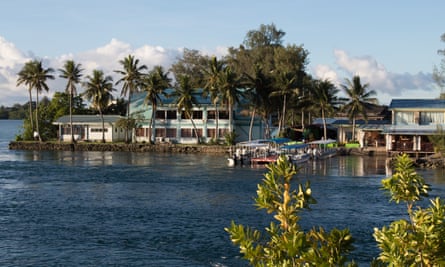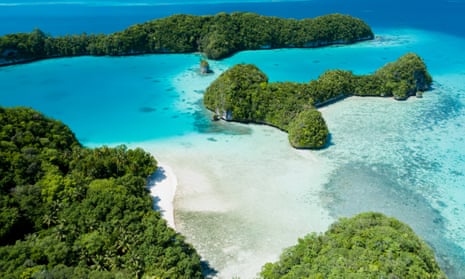On Thursday, 110 people from Taiwan will be able to enjoy the thing so many around the world have been dreaming of since the start of the Covid-19 pandemic: an international holiday to a tropical island paradise.
The tiny Pacific country of Palau, in the north-west corner of the Pacific with a population of around 20,000 people, will this week begin welcoming tourists from Taiwan as part of a travel bubble.
Palau’s first visitors for more than a year will get the royal treatment, with Palau’s president travelling to Taiwan to personally escort them to the islands.
For a chance to travel to Palau, one of Taiwan’s few diplomatic allies, Taiwanese must fork out between $2,100 and $2,800 to join a group tour booked via a travel agency. They must also tick a series of health regulation boxes, including an assurance that they have not left Taiwan within the past six months, and undergo a Covid-19 test at the airport.
The trip itself is limited to fewer than eight days and will largely avoid crowded locations in Palau. But even with the rules in place, travel agents in Taipei say they have been getting enquiries since the bubble was announced on 17 March.
KKDay, a popular travel startup offering discounts on bookings, has already sold out two Palau tours according to its website as well as more than 1,000 lottery tickets for a chance to win a spot on a multi-day tour.

‘We’ve been running on empty’
Ngirai Tmetuchl, chairman of the board of Palau Visitors Authority, said the bubble would benefit both nations.
Taiwanese tourists would get to “go to another country and enjoy the pristine waters of Palau” while his countryfolk could benefit from the boost to the archipelago’s economy, which is heavily reliant on tourism and which has been hit hard by the Covid-related border closures.
Before the pandemic, tourism accounted for nearly 50% of Palau’s GDP, with Taiwan making up the third-largest group of tourists to the country, after China and Japan.
Though the initial numbers arriving will be small, “Two hundred [tourists coming in the first two weeks] is more than zero, our options are zero or 200. We’ve been running on empty for a year, “ Tmetuchl said.
On the itinerary for the tourists will be trips out to Palau’s famous Rock Islands and the idyllic turquoise Jellyfish Lake, where swimmers can float amongst millions of gently-pulsating golden jellyfish, which have no stingers.
Eledui Omelau, president of Palau’s Boat Owners Association said it had been a difficult year for Palauan boat owners, with most of them taking out loans to survive and that the prospect of Taiwanese tourists was welcome.
“We have been hit hard, this travel bubble it’s a good opportunity for us, but at the same time we want to make sure we are ready,” Omelau said.

Despite the potential financial lifeline, he is not alone with his concerns about the risks that come with opening the country up to foreign tourists.
“We have to be very very careful,” said William Tsung, owner of Landmark Hotel, which will begin receiving tourists in April. “[The] ministry of health and the government did a good job, but opening this market in such a short time, is very, very scary. We are a Covid-free country but Taiwan is not Covid-free, Taiwan is Covid-safe … what happens if that one [case] comes in? After all this hard work for more than one year, we don’t want to see it, because we will end up suffering more than before.”
‘I am not ready’
The bubble will be tightly controlled, with strict rules about what tourists can and cannot do, including social distancing and minimal interaction with locals. No members of the community will be able to travel to the areas that tourists are visiting at the same time the tourists are there.
President Surangel Whipps Jr. has assured the country that the bubble, or what he calls the “sealed corridor”, poses minimal risk. Taiwan is considered to have handled the pandemic well, with just over 1,000 cases and 10 deaths in total.
“First of all Taiwan is Covid-free in the community, but we are testing them at the airport before they get on the plane,” he said. “But even without the testing, statics show that the chance of the Covid arriving in Palau is one-in-four million, or one in 40,000 flights.”

He argues that Palau has the medications and facilities to treat and contain any cases and also points to the country’s successful vaccination programme. More than 60% of Palau’s adult population is on track to have been vaccinated by mid-April, with 80% set to have received vaccinations by the summer.
“We are vaccinated. The high risk people have been vaccinated, the frontline [workers] have been vaccinated, the people in the travel agency have been vaccinated, that’s the protection we are getting . Yes, there is a risk but very minimal,” Whipps said.
“We want to open Palau but we are doing it safely, I know there are a lot of concerns but I hope that people will feel more confident and comfortable that we are doing this with much precaution as much as possible.”
The president is optimistic that if the first two weeks of the bubble are successful, more flights can be put on and the initial tourist cap of 200 can be lifted.
Despite Whipps’ reassurances, Tsung is also concerned that the restrictions imposed to ensure safety, especially those on room limits and hotel occupancy, will make it difficult for providers to make money.
“We will try our best to receive the tourists coming from Taiwan but so far for Palau, everything has gone up [in price]. You can feel everything is expensive. Groceries have come up. Oil has gone up since a year ago … and manpower is difficult too, because a lot of the workers left. Where can we find the manpower locally? My business is not ready, I am short staffed by 60%, even though my hotel is small. I am not ready,” Tsung said.
